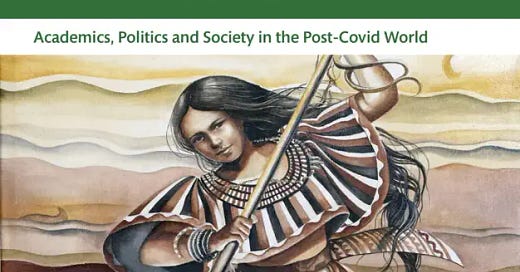By Danna Aduna
Editor’s Note: Danna Aduna is the author of “Time’s Up Ateneo: Moving from Institutional Complicity to Courageous Institutional Resilience in the Face of Sexual Violence,” published in Resilience and the Brown Babe’s Burden: Writings by Filipina Philosophers, edited by Tracy Llanera (Routledge, 2024). She is a philosophy PhD student at Macquarie University on unceded Dharug land, and her research is on institutional epistemic and affective injustice against sexual violence survivors in Philippine universities.
Author’s Note: I would like to extend care to the reader, especially those who have been closely affected by the issues my essay discusses. In my essay, I talk about how universities handle sexual violence cases and how they treat sexual violence survivors, their advocates, and protesters. Please take care, and thank you for reading.
Our volume Resilience and the Brown Babe’s Burden, edited by Dr. Tracy Llanera and with chapter contributions from myself and my dear colleagues in Women Doing Philosophy, came out in November 2024. As with other papers I have published, it was hard for me to re-read my chapter when it was finally out in the world. I first shared it with trusted friends, whose kind reading of my piece gave me the courage to face it again, but also to face why it was so difficult to return to.
You see, it was not simply my typical frustration as a scholar about how I would have wanted more time to polish my piece to my satisfaction (I had more than enough time, thanks to the great patience of our editor!). In the case of this chapter, it was not time that ran out, but my energy. The connected, and deeper, reason why I found it difficult to re-read my piece was that it touches right at the heart of a question which I find many of us in my discipline, having witnessed or experienced abuses of power and injustice within it, have had to ask ourselves: Should I stay in philosophy? And in my particular case: Why am I still here?
I started writing this chapter in 2021 about my experience of protesting sexual violence in my former philosophy department and university, and the aftermath. I described the process to my friends as that of wringing out from such a difficult, almost breaking experience whatever can be deemed “philosophical.” The violence of that metaphor is not lost on me.
The chapter became a record of the kind of intellectual and emotional labor that my former university routinely demanded from me and my comrades, especially survivors. It was always uncompensated, at best privately or ambiguously acknowledged, often co-opted.
What motivated me to undertake the work of activist scholarship was a frustration about the burdens that I found to be placed on survivors—and the kind of labor that universities extract from them. I began my chapter with questions, ones which reflect the kind of questions that I found survivors are often asked by their institutions:
What can the institution do, if there’s no formal complaint?
The abuser had already been given a sanction, what more do you want?
How can we move forward?
There is such violence, I feel, in constantly imposing on survivors the burden of explaining oneself, of explaining trauma and injustice, of advocating for themselves, again and again. Especially given how often institutions fail in the duty to stretch their ethical imagination, and to expand their capacity to listen and understand.
The philosophy I write nowadays, I write in the hopes that a survivor or activist can wave it in their institutions’ faces and say, this—this is you too. So I guess my hope (modest or ambitious, I don’t know) is that somehow, in some small way, my work helps someone explain themselves a bit more easily—helps that burden be made just a little less immense.
I started this essay with the question: Why am I still in philosophy? I think when it comes to the kind of burdens I talk about here, activist-leaning and grassroots-informed philosophy can play a promising role. I think good philosophy is one that is aware that the kind of questions we ask matter—that some questions can obscure or reproduce harm, while some questions can extend and invite care. And that sometimes, questions have to be resisted, if they are a way for people in power to impose unjust burdens on the vulnerable. And just maybe, some of our attempts at asking questions and sketching out answers in philosophy can alleviate that burden of explaining oneself, or at the very least, help someone feel a little more understood.
So if my chapter, that I now re-read and share with some reluctance, reaches one survivor or activist, and it helps them feel a little less alone, a little more understood, then that wringing out, this ambivalence I now feel about the thoughts I’ve committed to paper, and the ambivalence I still have to the question of staying, will have been more than worth it.
Author’s Acknowledgements: I am indebted and deeply grateful to my comrades in Time’s Up Ateneo, and to survivors everywhere.




